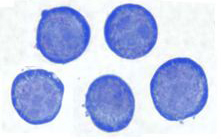
Photograph of murine erythroid precursors that
have undergone extensive self-renewal in vitro.
Over 30 percent of the world’s population suffers from anemia and approximately 15 million units of blood are transfused yearly in the United States. We have discovered unique red blood cell precursors in the mouse embryo, and also from embryonic stem cells, that can proliferate for months in culture and yet maintain their potential to rapidly become mature red cells. We are currently investigating the mechanisms responsible for the extensive self-renewal capacity of such lineage restricted and mature hematopoietic precursor cells. Developing the ability to grow extensively self-renewing human red blood cell precursors will allow us to better investigate the differentiation of erythroid cells and ultimately provide for universal donor red blood cells to treat children and adults with life-threatening anemias.
Reference:
-
Kim AR, Olsen J, England SJ, Huang Y-S, Fegan KH, Delgadillo L, McGrath KE, Kingsley PD, Waugh R, Palis J. Bmi-1 regulates extensive erythroid self-renewal. Stem Cell Reports 4:995-1003, 2015.
-
England SJ, McGrath KE, Frame J, Palis J: Immature erythroblasts with extensive ex vivo self-renewal capacity emerge from the early mammalian fetus. Blood, 117:2708-2717, 2011.